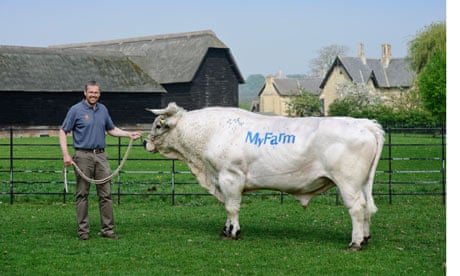A large working farm will be taken over for the first time by web users across the world on Wednesday, who will vote on every key decision taken on its cattle, pigs, sheep and crops.
The MyFarm experiment hands over power at the National Trust's 2,500-acre Wimpole Estate farm in Cambridgeshire, UK. Up to 10,000 farming novices will choose which bull to buy, which crop to plant and whether to spilt fields to resurrect lost hedgerows.
"I will put in here whatever the online farmers want to grow," said Richard Morris, Wimpole's manager, standing on the edge of Pond Field, currently green with grass and clover rippling in the wind. "Farming is always a compromise – there is never a right or a wrong answer. If I choose one thing, my neighbour will be leaning over the fence shaking his head.
"The online farmers will not be able to choose to grow cannabis or bananas, but undoubtedly there will be some strange decisions, some decisions I would not have made."
The National Trust is the UK's biggest farmer, said Fiona Reynolds, its director-general. "This is all about reconnecting people to where their food comes from. Our TNS poll showed that only 8% of mothers feel confident talking to their children about where their food comes from. That's really poignant."
Farmville, the virtual farming game that currently has 47 million players a month and is Facebook's second most popular game, was one inspiration, said project manager John Alexander, who came up with the MyFarm idea while working in a previous job at an advertising agency. "But this is a real farm," he added.
Online farmers will run the farm through discussions that end in votes, with the first option past the post the winner. Morris will set out the context for the decision, in the first instance what to grow in the 21-hectare Pond Field, and propose options.
Information to help people decide will come through blogs and videos. Other decisions could include choosing the new bull for one of the rare-breed herds or reinstating an old pond to encourage wildlife.
Morris says all major decisions will be put to the MyFarm users.
There will be one big vote each month, but these could trigger more frequent votes. In Pond Field, for example, if wheat is chosen, should it be bread-making wheat or biscuit wheat? "I am making decisions every day," he says. "The first thing I do after getting up is look at the weather out of the window, and that sets the day going."
Right now, with 300 new lambs delivered and scampering in the fields, Morris is bringing in grass to make silage for next winter's feed. But the dry weather has left the fields short of grass, so the young cattle are being left in the barns for a while, to make sure the sheep have enough.
In the future, Morris says, there will be a smartphone app which will allow him to get near instant decisions from the online farmers. "For example, if I have wheat in the field, ripe and ready, but rain in the morning means it is damp, do we risk waiting and losing some of the crop, or combining [harvesting] it now and incurring some extra drying costs?"
From the ginger-bristled pig snoring in the spring sunshine, to the free range hens, to the oats, barley or wheat in the fields, the online farmers will have to learn to juggle the competing factors that Morris faces each day, financial, ethical and environmental.
Arthur Potts Dawson, co-founder of the mutual business, the People's Supermarket which now has 1500 members, said: "MyFarm is brave, even mad, but the People's Supermarket was considered mad when we started. Both help prevent you blindly walking around a supermarket not knowing where your food comes from."The online farmers will need to pay a one-off £30 fee to join, which also allows them to visit the farm in person. Reynolds defended the fee. "We are a charity and there is a big upfront cost we need to cover. It feels like a reasonable cost. If we get many more [than 10,000] we could reduce the fee in the future conceivably."
But Nicholas Lovell, a games consultant and founder of the Gamesbrief blog, is yet to be convinced: "There is something in the idea that people like to grow, nurture and beautify things. But Farmville's success is down to the craftsmanship of hooking into basic human psychology: the need to finish things we've started, to return gifts when we're given them and many, many more.
"A Farmville for which people had to pay £30 to access would have flopped miserably. By charging for access, the National Trust is taking the success of Farmville as being about farming, when I think it was about bringing accessible, cost-effective, well-designed gaming to a new audience."
Alexander acknowledged: "The fee is where the comparison with Farmville falls on its cow-like bottom." Zynga, creators of Farmville, declined to comment.
For Morris, the MyFarm experiment continues the tradition of innovation on the Wimpole Estate that dates to the 1790s when the Earl of Hardwick new machinery, crops and breeding techniques. "If we are going to find a [sustainable] way to feed 9 billion people by 2050 farming needs to change, but it can't do it on its own, it needs public opinion to change too."
But, however successful MyFarm turns out to be, Morris's 10,000 new bosses may not be able to direct him every moment of the day: the mobile signal on Wimpole farm is very patchy. "I know where I am heading" if things get tough, he joked.

Comments (…)
Sign in or create your Guardian account to join the discussion